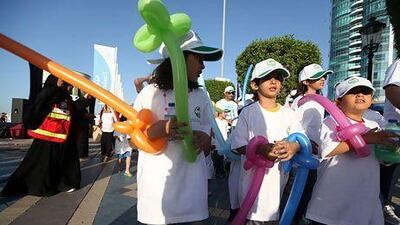ABU DHABI // The 20th annual World Water Day was commemorated yesterday with a "March for Water" along the city's Corniche.
Residents from across the capital walked alongside members of the Abu Dhabi Farmers' Services Centre, the organisation behind the event, which was aimed at highlighting the importance of fresh water and its sustainable use.
"Awareness and education is the most important aspect of our campaign," said Dr Ismail Al Hosani, the manager of the services centre, which supports the farmers of the emirate by providing technical and operational support.
"It is essential we educate the children of the Emirates the value of this precious resource and overall the youth are more receptive and willing to apply what they are taught."
As part of the campaign, Dr Al Hosani said the centre gave lectures on the importance of responsible water use in 10 schools last week.
"I think it is important to save water in the UAE because we don't have much," said Mohammed Jamal Abu Fadalah, 14, who is in Grade 8 at Bait Al Maqdis school.
Mohammed, who took part in yesterday's march with his family, added: "In school and at home they taught me to not waste water and I turn off the tap quickly every time I use it."
Also in attendance was Najid Ullah, 27, an environmental engineer in Ruwais. "I was interested and also appreciate an event like this because it raises awareness about the limited water available for the crops of Abu Dhabi."
With approximately 24,000 farms in the emirate which, with forests and parks, accounted for 72 per cent of the Abu Dhabi's water use, the Government has set its sites on a drastic reduction of its water use.
"Agriculture is the largest consumer of water in the UAE," said Ray Maulle, the technical service director at the Abu Dhabi Farmers' Services Centre.
"Farming has led to a considerable decrease in underground water levels which take a long time to replenish."
Measures such as limiting the widespread use of Rhodes Grass, an excessive water consumer, in favour of less thirsty fodder had slowed the consumption of valuable ground water.
Dr Al Hosani added: "With the use of these alternative grasses which need less water and are more accepting of water with higher levels of saline we have seen ground water levels getting better in some parts."
Mr Maulle, however, said although there had been a significant decrease in the rate of reduction of ground water levels it was too early to say whether these actions would have a lasting impact.

